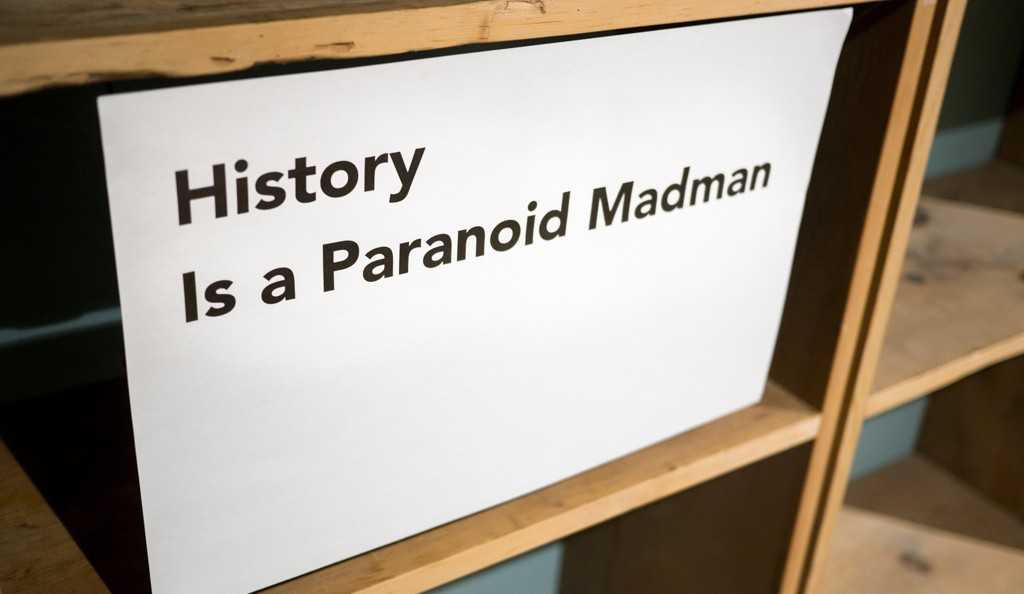Rebuild Foundation: A Government of Times ~ from the South-Side of Chicago ~ Curators : Aliocha Imhoff & Kantuta Quirós
December 12, 2015 – January 25, 2016
Rebuild Foundation, in partnership with the French Embassy, the Institut français and the Théâtre de la Ville, is pleased to welcome Aliocha Imhoff & Kantuta Quirós as Curators-in-Residence of the Méthode Room, an International Curatorial Residency program in South Side Chicago, directed by Guillaume Désanges. During their three-months residency, they will produce a two-part project that includes an exhibition and the production of a film.
Featuring artists Black Quantum Futurism (Rasheedah Phillips, Camae Defstar), Mark Tribe, Daniel Eisenberg, Irina Botea, Jean-Stéphane Bron, Sven Johne, Roee Rosen, Milo Rau, Collectif Essai & Armin Linke, Philippe Moser & Frédéric Schwinger, Lia Perjovschi and featuring texts and documents by Walter Benjamin, Alex Williams and Nick Srnicek, Benjamin Noys, Camille de Toledo, Paul B. Preciado, Cristina Freire, Gloria Anzaldua, Fredric Jameson, Paolo Virno, Johannes Fabian, Reinhart Koselleck, François Hartog, Gilles Deleuze, Steven Shaviro, Hartmut Rosa, Kodwo Eshun, Mark Dery, Dipesh Chakrabarty, Raqs Media Collective, Zendka Badovinac, Jacques Derrida, Elizabeth Freeman, Robin Morgan, Yvan Schulz, Khan Yasir, among many others.
Born from a modernity at the end of its rope, a « presentist » regime of historicity has emerged since the late 1980s.
An exhibition and a film will be imagining alternative regime of historicity for the future.
No one doubts that an order of time exists — or rather, that orders of time exist which vary with time and place. Historian François Hartog explored crucial moments of change in society’s « regimes of historicity » or its ways of relating to the past, present, and future. According to Hartog, contemporary Western societies have entered from 1989 a new “regime of historicity” (a synonym for temporal order) into a “presentist regime of historicity” defines it as a temporal order of static historicity, characterised by the end of expected horizons and as an invasion of the present into the realms of the past and future. How can we set time back in motion, to liberate us from the presentism to which we seem compelled in Europe particularly ?
On opposite side from presentism, new wave of contemporary accelerationism as social emancipation recently emerged, as a way to put time back in motion. The only way out of capitalism would be to take it further, to follow its lines of flight or deterritorialization to the absolute end, to speed-up beyond the limits of production and so to rupture the limit of capital itself. But, these new visions of acceleration are also problematic, being centralised and planificated scripts for the future. And, as Benjamin Noys added it, speed is, still, a problem. Our lives are too fast, we are subject to the accelerating demand that we innovate more, work more, enjoy more, produce more, and consume more. Hartmut Rosa declares that today we face a ‘totalitarian’ form of social acceleration.
Exploring chronopolitics, the exhibition that will take place in the Archive House / Méthode Room will propose a lexicon of disruptive temporalities, a semantic of times as a toolbox for the regime of historicity to come, specially thought for the context of Chicago[5] and will display as well artists’ films and documents. Summoning concepts from recent historiographical renewal, the exhibition focuses on alternative temporalities put forward by artists, overlapping temporalities – a spectrality of memory and speculation – to rethink the staging of times. These « polychronic devices » are together imagining a multi-temporal and non-presentist contemporaneity and finally, tend toward a new politics of time, and, even more, a possibility to govern the times differently : to imagine a « differential government of times », as it has been advocated by the philosopher Daniel Innerarity in his book, The future and Its Enemies (Stanford University Press, 2012). » (A.I.&K.Q.)
The exhibition will be open to the public every Saturday from 2pm to 7pm and by appointment seven days a week

